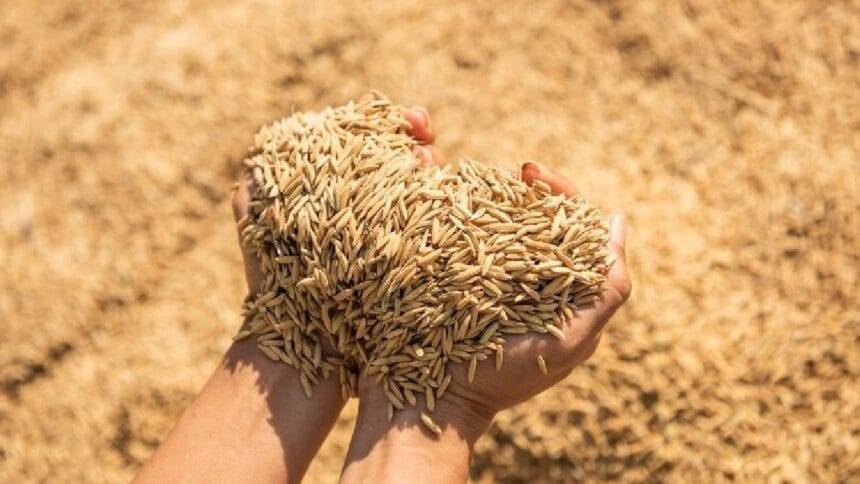Main Points In Hindi (मुख्य बातें – हिंदी में)
यहां पर दिए गए लेख के मुख्य बिंदु हैं:
-
धीमी सरकारी खरीद: भारत में इस वर्ष चावल की सरकारी खरीद बहुत धीमी पड़ गई है, जबकि पिछले वर्ष इसी अवधि में हरियाणा और पंजाब से लगभग 80 लाख मीट्रिक टन धान की खरीद की गई थी। वर्तमान में केवल 45 लाख मीट्रिक टन धान की खरीद हुई है।
-
खराब भंडारण स्थिति: संयुक्त किसान मोर्चा (SKM) ने आरोप लगाया है कि खाद्य निगम (FCI) द्वारा पूर्व के खरीदे गए धान का उचित उठाव नहीं किया गया है जिससे खरीद में संकट उत्पन्न हुआ है। इससे किसानों को अपने धान को बेचना मुश्किल हो रहा है।
-
खाद्य सब्सिडी में कमी: केंद्र सरकार ने खाद्य सब्सिडी में भारी कटौती की है, जिसके कारण अनाजों का उठाव कम हो गया है और किसानों को न्यूनतम समर्थन मूल्य (MSP) पर अपनी फसलों को बेचने में कठिनाई हो रही है।
-
डायरेक्ट बेनिफिट ट्रांसफर (DBT) का प्रभाव: कई राज्यों में खाद्य सुरक्षा अधिनियम के नियमों में बदलाव किया जा रहा है, जिसके तहत अनाज वितरण प्रणाली का लाभ सीधे किसानों के बैंक खातों में धनराशि स्थानांतरित किया जा रहा है, जिससे खाद्य निगम से अनाज नहीं उठाया जा रहा है।
- राज्य सरकारों की विफलता: पंजाब एवं हरियाणा की राज्य सरकारों पर केंद्र सरकार पर धान के भंडारण से अनाज उठाने का दबाव बनाने में असफल रहने का आरोप लगाया गया है, जिसके कारण MSP पर धान की खरीद में बाधा उत्पन्न हो रही है।
Main Points In English(मुख्य बातें – अंग्रेज़ी में)
Here are the main points from the provided text:


-
Slow Government Procurement: Paddy procurement by the government is significantly slow this year, with only 45 lakh metric tonnes procured by October 22, 2024, compared to 80 lakh metric tonnes during the same period last year in Haryana and Punjab. This slower pace has led to farmer dissatisfaction and protests.
-
Allegations Against Central Government: The Samyukt Kisan Morcha (SKM) blames the central government for the shortfall in procurement due to previous failures to lift purchased paddy from warehouses, as well as cuts in food subsidies that have created hindrances in the procurement process.
-
Reduction in Food Subsidy: The Food Corporation of India (FCI) and SKM highlight a significant reduction in food subsidies over recent years, affecting the procurement of grains essential for the Public Distribution System (PDS). The food subsidy dropped from Rs 2,72,802 crore in 2022-23 to Rs 2,05,250 crore in 2024-25.
-
Link to Direct Benefit Transfer (DBT): Changes in the Food Security Act have led several states to adopt a Direct Benefit Transfer scheme, where monetary aid replaces the provision of food grains. This has further complicated procurement as states like Maharashtra have moved away from lifting grains from the FCI.
- Criticism of State Governments: The SKM criticizes the Punjab and Haryana governments for not effectively pressuring the central government to expedite the lifting of stocks, contributing to the procurement issues and creating unrest among farmers who rely on the Minimum Support Price (MSP) for their crops.
Complete News In Hindi(पूरी खबर – हिंदी में)
देश में इस साल धान की सरकारी खरीद बहुत सुस्त चल रही है। खाद्य निगम (FCI) के अनुसार, 22 अक्टूबर 2024 तक केवल 45 लाख मीट्रिक टन धान ही खरीदा गया है। जबकि पिछले साल इसी समय में हरियाणा और पंजाब में लगभग 80 लाख मीट्रिक टन धान खरीदा गया था। सवाल यह है कि इस बार धान की सरकारी खरीद इतनी धीमी क्यों है, जिसके कारण किसान सरकार के खिलाफ अपना गुस्सा जता रहे हैं? संयुक्त किसान मोर्चा (SKM) का आरोप है कि पिछले सीजन में FCI ने खरीदे गए धान को भंडार से उठाने और चावल मिलों से उठाने में असफलता दिखाई। इसके कारण इस साल पंजाब और हरियाणा में धान की खरीद में संकट आ गया है। किसानों को धान बेचना मुश्किल हो रहा है, क्या नई खरीद तब ही होगी जब भंडार खाली हो जाएगा?
SKM ने पंजाब और हरियाणा में धान की खरीद में कमी के लिए केंद्र सरकार को जिम्मेदार ठहराया है। ये दोनों राज्य केंद्रीय भंडार के लिए सबसे ज्यादा खरीद करते हैं। संगठन ने कहा कि वित्त मंत्री निर्मला सीतारमण ने केंद्रीय बजट 2022-23 और 2023-24 में खाद्य सब्सिडी में कटौती की है। 2024-25 में भी यह कटौती जारी है, जिससे खाद्य सब्सिडी में 67,552 करोड़ रुपए की कमी आई है। इसके कारण भंडार से अनाज उठाने में रुकावट आ रही है, जो खरीद में बाधा डाल रहा है। सरकारी खरीद की कमी के कारण व्यापारी धान को बहुत कम कीमत पर खरीद रहे हैं। बासमती धान की कीमत भी पिछले साल की तुलना में प्रति क्विंटल एक हजार रुपए कम हो गई है।
अभी पढ़ें: प्याज की कीमत: एक साल में प्याज की कीमत में 42 प्रतिशत की बढ़ोतरी, विधानसभा चुनावों के बीच किसानों का लाभ।
खाद्य सब्सिडी में कटौती का प्रभाव?
SKM ने वित्त मंत्री निर्मला सीतारमण से पूछा है कि उन्होंने गरीबों के लिए खाद्य सब्सिडी में कटौती का कठोर निर्णय क्यों लिया। इसके अलावा, केंद्र सरकार ने केंद्रीय भंडारण निगम (CWC) को समाप्त कर दिया है, जिससे सार्वजनिक क्षेत्र में भंडारण सुविधाओं में भारी कमी आई है। FCI ने अपनी भंडारण सुविधाएं कई निजी कंपनियों को किराए पर दी हैं, जिसके कारण समस्याएं उत्पन्न हो रही हैं। जबकि केंद्र ने 2024-25 के लिए 485 लाख टन चावल खरीदने का लक्ष्य रखा है। इस साल सरकार ने सामान्य धान का न्यूनतम समर्थन मूल्य (MSP) 2300 रुपए प्रति क्विंटल तय किया है।
कितनी सब्सिडी में कटौती की गई?
SKM ने कहा कि केंद्रीय बजट 2022-23 (वास्तविक) में खाद्य सब्सिडी 2,72,802 करोड़ रुपए थी। बजट 2023-24 (संशोधित) में केवल 2,12,332 करोड़ रुपए खर्च किए गए, यानी 60,470 करोड़ रुपए की कटौती की गई। जबकि 2024-25 के बजट में सब्सिडी का अनुमान केवल 2,05,250 करोड़ रुपए रह गया, यानी 7082 करोड़ रुपए की कमी। इस कटौती के कारण सार्वजनिक वितरण प्रणाली (PDS) से गेहूं और चावल पहले की तरह नहीं उठाए जा रहे हैं, जिससे खरीद प्रभावित हो रही है और किसान परेशान हो रहे हैं।
अनाज के बदले पैसे का ट्रांसफर
संस्थान ने कहा कि कई राज्य खाद्य सुरक्षा अधिनियम-2013 के नियमों में बदलाव करके PDS को डायरेक्ट बेनिफिट ट्रांसफर (DBT) योजना से जोड़ रहे हैं, जिसके तहत लाभार्थियों को अनाज देने के बजाय उनके बैंक खातों में पैसे ट्रांसफर किए जा रहे हैं। उदाहरण के लिए, महाराष्ट्र में राज्य सरकार ने 32 लाख राशन कार्ड धारकों को DBT के माध्यम से लाभ देना शुरू किया है। इसके कारण उन्होंने FCI से चावल और गेहूं उठाना बंद कर दिया है। कर्नाटका में, severe drought के बावजूद, केंद्र सरकार ने चावल नहीं दिया, जबकि राज्य सरकार ने खाद्यान्न की मांग की थी।
हरियाणा-पंजाब की आलोचना
मोर्चा ने पंजाब के भगवंत मान और हरियाणा के बैब सिंग सैनी सरकार की भूमिका की भी कड़ी आलोचना की है। आरोप लगाया गया है कि दोनों सरकारें केंद्र पर समय पर धान के स्टॉक को उठाने के लिए दबाव नहीं बना सके। जिससे MSP पर धान खरीदने की प्रक्रिया प्रभावित हो रही है। अगर खरीद प्रणाली बुरी तरह प्रभावित होती है, तो किसानों में असंतोष फैल सकता है। हालांकि पंजाब के मुख्यमंत्री भगवंत मान ने दो दिन के भीतर कार्रवाई का आश्वासन दिया है, लेकिन रिपोर्ट के अनुसार खरीद में कोई महत्वपूर्ण वृद्धि नहीं हुई है। देश में सबसे अधिक धान पंजाब से ही खरीदा जाता है।
इसे भी पढ़ें: एक हेक्टेयर में बुवाई के लिए कितनी गेहूँ की बीज की आवश्यकता होगी, कौन सी हैं सर्वश्रेष्ठ किस्में?
Complete News In English(पूरी खबर – अंग्रेज़ी में)
Government procurement of paddy in the country is very slow this year. According to the Food Corporation of India (FCI), till October 22, 2024, hardly 45 lakh metric tonnes of paddy has been procured in the country. Whereas during the same period last year, about 80 lakh metric tonnes of paddy has been purchased only in Haryana and Punjab. But the question is, why is the government procurement of paddy so slow this time that farmers are forced to express their anger against the government? Samyukt Kisan Morcha (SKM) has alleged that during the last season, FCI has failed to lift the paddy purchased at MSP from the warehouses and rice from the mills. Due to which a crisis of paddy procurement has arisen in Punjab and Haryana this year. To sell paddy, farmers have to sell papad. Will new purchases be made only when the warehouse is empty?
SKM has blamed the central government for the shortfall in paddy procurement in Punjab and Haryana. Both of these are among the states making maximum purchases for the central pool i.e. buffer stock. The organization said that Finance Minister Nirmala Sitharaman has cut food subsidies in the Union Budget 2022-23 and 2023-24. The cut has been continued in 2024-25 as well, leading to a reduction of Rs 67,552 crore in food subsidy. Due to this, the lifting of grains from warehouses has been affected, which is creating hindrance in procurement. Due to lack of government procurement, traders are buying paddy at throwaway prices. Even the price of Basmati paddy is less by one thousand rupees per quintal as compared to last year.
Also read: Onion Price: Onion price increased by 42 percent in a year, bumper profits for farmers amid assembly elections.
Effect of cut in food subsidy?
SKM has asked Finance Minister Nirmala Sitharaman to tell the people why she adopted such a harsh policy of cutting food subsidies for poor people. Not only this, the Central Government has abolished the Central Warehousing Corporation (CWC), due to which there has been a massive reduction in storage facilities in the public sector. FCI has also given its storage facilities on rent to many private companies. Due to which problems are arising. Whereas the Center has set a target of purchasing 485 lakh tonnes of rice for 2024-25. This year the government has fixed the MSP of common paddy at Rs 2300 per quintal.
How much subsidy was cut?
SKM said that the food subsidy in the Union Budget 2022-23 (actual) was Rs 2,72,802 crore. Only Rs 2,12,332 crore was spent in Budget 2023-24 (revised), i.e. Rs 60,470 crore was cut. Whereas the estimate of subsidy in the budget of 2024-25 has remained only Rs 2,05,250 crore, i.e. reduced by Rs 7082 crore. Due to the cut, wheat and rice in the Public Distribution System (PDS) have not been lifted as much as before, due to which procurement is now being affected and farmers are having to suffer the consequences.
money transfer in exchange of food grains
The organization said that many states are linking PDS with the Direct Benefit Transfer (DBT) scheme by changing the rules of the Food Security Act-2013, under which instead of systematically giving grains to the beneficiaries, money is transferred to their bank accounts. going. For example, in Maharashtra the state government has started providing benefits to 32 lakh ration card holders through DBT. Because of this, they have stopped lifting rice and wheat from the Food Corporation of India (FCI). In Karnataka, despite severe drought, the central government did not provide rice, while the state government demanded food grains.
Criticism of Haryana-Punjab
The Morcha has also strongly criticized the role of Bhagwant Mann government of Punjab and Naib Singh Saini government of Haryana. It is alleged that both these governments have failed to put pressure on the Center to lift the paddy stock from warehouses and rice mills on time. Due to which the process of purchasing paddy at MSP is being disrupted. If the procurement system derails, there will be unrest among farmers. Although Punjab Chief Minister Bhagwant Mann has assured action within two days, according to reports there has been no significant increase in procurement. Most of the paddy in the country is procured from Punjab only.
Read this also: How much wheat seeds will be required for sowing in one hectare, which are the best varieties?










